Select Language
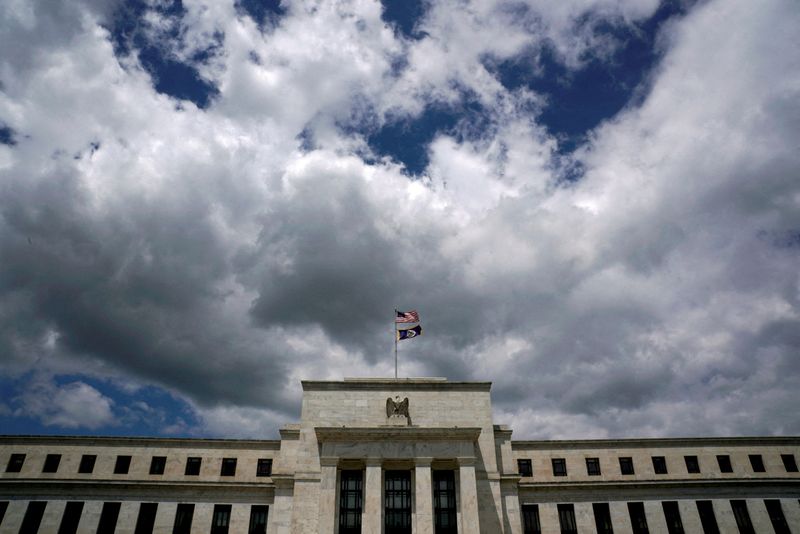
Federal Reserve officials are likely to stick to a wait-and-see approach to future interest rate decisions, as the central bank grapples with uncertainty around the inflationary impact of U.S. President Donald Trump’s aggressive tariff agenda, according to analysts at Deutsche Bank.
In a note to clients, the brokerage predicted that the Fed will not resume its now-paused rate-cutting cycle until December, followed by two additional reductions in the first quarter of 2026.
The analysts led by Amy Yang estimated that borrowing costs will be brought down to a neutral level -- a theoretical rate that neither helps nor hinders economic activity -- of 3.625%.
Deutsche Bank’s projections come as markets are all but pricing in no action by the Fed at its June and July meetings. CME Group’s (NASDAQ:CME) closely-monitored FedWatch Tool suggests there there is a 54.7% chance the Fed ratchets rates down by a quarter of a percentage point in September.
The central bank has recently left rates unchanged at a range of 4.25% to 4.5%, partly citing uncertainty around the impact of Trump’s tariffs on inflation and employment.
Economists have warned that Trump’s sweeping duties could drive up prices and weigh on activity in the world’s largest economy. Yet recent data, including a stronger-than-anticipated reading of U.S. employment in May, has bolstered arguments that the wider economy may be resilient in the face of headwinds from the tariffs.
Figures this week are set to provide a fresh glimpse into the trajectory of inflation.
The Labor Department’s consumer price index for May is tipped to speed up slightly to 2.5% from 2.3%, while the month-on-month gauge is expected to match April’s pace of 0.2%. Cutting out more volatile items like food and fuel, the index is seen edging up to 2.9% year-over year and 0.3% on a monthly basis. Following the release of the numbers on Wednesday, further data points are due out that track producer prices and consumer expectations for inflation in the months ahead.
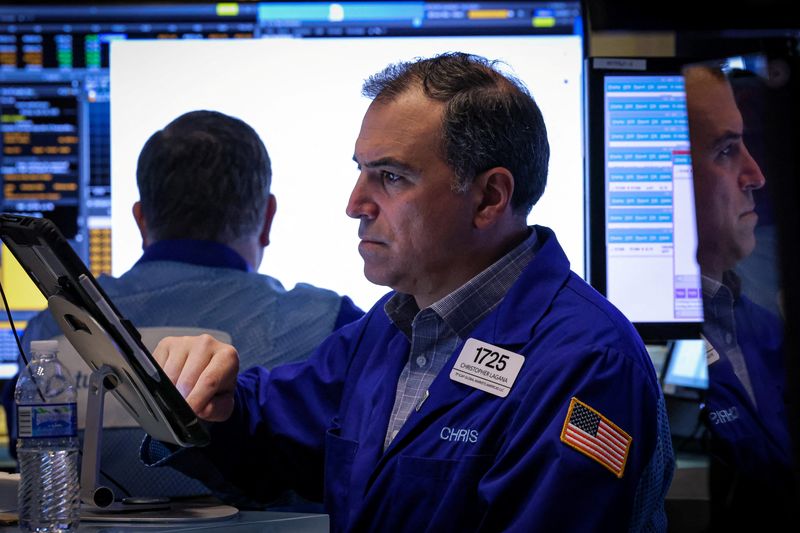
U.S. stock futures edge lower as traders turn their gazes towards renewed U.S.-China trade talks in London. Markets are hoping that the discussions will lead to a ratcheting down in trade tensions between the world’s two largest economies, who have been at loggerheads over issues like tariffs and export controls. Elsewhere, Apple (NASDAQ:AAPL) is set to deliver a closely-watched keynote address at its annual developers conference, while Chinese export growth slows in May.
1. Futures dip
U.S. stock futures pointed lower on Monday, with investors looking ahead to a fresh round of trade talks between the U.S. and China as well as key inflation figures later this week.
By 03:30 ET (07:30 GMT), the Dow futures contract had slipped by 46 points, or 0.1%, S&P 500 futures had fallen by 6 points, or 0.1%, and Nasdaq 100 futures had dropped by 39 points, or 0.2%.
The main averages on Wall Street ended higher on Friday, fueled by a stronger-than-anticipated U.S. labor market reading for May, and President Donald Trump’s announcement of today’s meeting between U.S. and Chinese officials in London (more below). Shares in Tesla (NASDAQ:TSLA) also rebounded from a slump that stemmed in part from a verbal and online brawl between CEO Elon Musk and Trump.
At the close of trading, the S&P 500 stood at above the 6,000 for the first time since February 21.
2. U.S.-China trade talks to be renewed
Crunch discussions between the U.S. and China at an undisclosed location in London are set to be major focus for markets on Monday.
Investors are optimistic that the world’s two largest economies will achieve a rapprochement following a period of increased trade tensions.
Both sides have been at odds over Trump’s threat of elevated tariffs and the supply of rare earth minerals from China, despite a preliminary agreement reached in Geneva last month that included a temporary pause and lowering of punishing tit-for-tat levies. Trump’s so-called "reciprocal" duties on China are now on hold until August 12.
Treasury Secretary Scott Bessent, U.S. Trade Representative Jamieson Greer and Commerce Secretary Howard Lutnick are due to represent Washington during the discussions, while Vice Premier He Lifeng will helm China’s contingent.
Last week, Trump and Chinese counterpart Xi Jinping spoke for over an hour on the phone. Trump said the conversation was mostly focused on trade and had a "very positive conclusion", although a Chinese government account noted that Xi told Trump to back away from his aggressive trade measures and avoid taking steps to support Taiwan.
3. Apple WWDC keynote address
Outside of politics, markets will be keeping tabs on Apple’s annual Worldwide Developers Conference, which is due to begin on Monday with the iPhone maker’s traditional keynote address.
The event typically pulls away the veil on some of Apple’s software updates due to be made available in the autumn -- and media reports have suggested that the tech giant’s latest changes to its all-important operating system this time around could be among the most consequential in years.
Bloomberg News has reported that Apple will likely debut a new numbering regime for its operating system, shifting from a sequential series to one based on the year. Apple’s iOS 26, for example, is reportedly tipped to include major design changes, but little is currently known beyond potential improvements to the artificial intelligence-enhanced Apple Intelligence service.
Meanwhile, Apple’s promised move to bring more AI into its Siri voice assistant is likely not coming this week, after the firm said three months ago that the upgrade was taking longer than initially projected.
A perceived lack of progress on AI has partly dented sentiment around Apple, sending shares in the company down by more than 16% so far this year.
4. Chinese export data
China’s export growth decelerated to a three-month low in May as the country grappled with U.S. tariffs that weighed on shipments.
Customs data showed that China’s exports to the U.S. slipped by 34.5% versus the prior year in value terms -- the steepest decline since the outbreak of the COVID-19 pandemic roiled global trade in early 2020.
Overall exports, a key driver of the country’s massive trade surplus, still expanded in May, albeit at a slower than expected pace, while growth in exports also weakened sharply. Exports grew 4.8% year-on-year missing expectations for a 5% rise and falling from the 8.1% rise seen in the prior month.
But the country’s imports fell substantially more than expected in May, reflecting weak demand at home amid increased economic uncertainty and sluggish consumer spending. Chinese imports fell 3.4% year-over-year, compared to an expected drop of 0.9% and deepening their decline from a 0.2% fall in the prior month.
5. Oil retreats
Oil prices slipped lower Monday, but have retained most of last week’s gains as traders watched for news from the U.S.-China trade talks in London.
At 03:30 ET, Brent futures slipped 0.5% to $66.16 a barrel, and U.S. West Texas Intermediate crude futures fell 0.4% to $64.30 a barrel.
The prospect of a U.S.-China trade deal have boosted some investors’ risk appetite and supported oil prices amid hopes a deal will boost economic growth and thus demand for energy.
Brent had advanced 4%, and WTI gained over 6%, last week, their first weekly gain in three weeks.
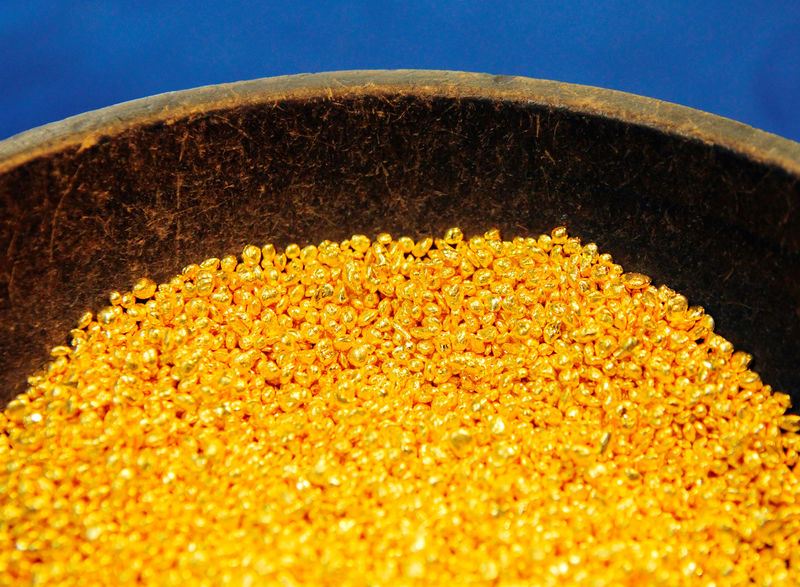
Gold prices rose on Friday and were headed for a positive week as haven demand was underpinned by uncertainty over U.S. trade policy and caution before a key U.S. payrolls reading.
Bullion, along with broader metal prices, also benefited from a softer dollar, which languished near two-year lows amid few positive cues over the U.S. economy.
A sharp sell-down on Wall Street, which was triggered by an escalated, public feud between President Donald Trump and billionaire Elon Musk, also boosted risk appetite.
Spot gold rose 0.5% to $3,368.86 an ounce, while gold futures for August rose 0.5% to $3,392.27/oz by 01:38 ET (05:38 GMT).
Trump’s flagging of a positive call with Chinese President Xi Jinping, which could revitalize U.S.-China trade talks, also did little to deter risk aversion, while increased military action between Russia and Ukraine also boosted haven demand.
Gold buoyed by haven demand as nonfarm payrolls approach
Gold was set to gain about 2.4% this week, with spot prices now about $140 away from recent record highs.
Demand for the yellow metal remained underpinned by heightened uncertainty over the U.S. economy and trade tariffs.
Nonfarm payrolls data due later on Friday is expected to read softer for May, especially following a string of weak labor market readings through the week. U.S. hiring trends were dented by increased uncertainty over economic policy under Trump, especially his tariff agenda.
A softer labor market is expected to give the Federal Reserve more impetus to cut interest rates, a notion that weighed on the dollar this week. Trump also reiterated his demands that the Fed cut interest rates soon.
Still, the central bank is still expected to leave rates unchanged when it meets later this year.
Metal prices advance as dollar stalls near 2-yr low
Broader metal prices largely benefited from a weaker dollar, and were set for weekly gains. The greenback was trading down 0.5% this week and was close to a two-year low hit in April.
Platinum futures rose 1% to $1,154.0/oz, while silver futures rose 0.9% to $36.128/oz.
Among industrial metals, benchmark copper futures on the London Metal Exchange rose 0.1% to $9,728.25 a ton, while U.S. copper futures rose 0.1% to $4.9150 a pound.
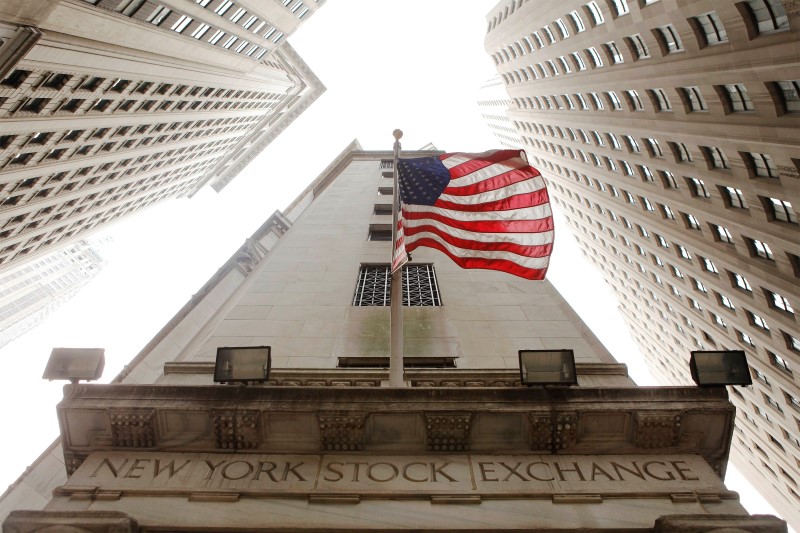
U.S. stock index futures edged higher Thursday, with investors assessing a raft of labor market data this week while awaiting more clarity over the Trump administration’s trade policies.
At 05:05 ET (09:05 GMT), Dow Jones Futures gained 80 points, or 0.2%, S&P 500 Futures rose 7 points, or 0.1%, and Nasdaq 100 Futures climbed 22 points, or 0.1%.
The main averages on Wall Street traded in narrow ranges Wednesday, amid uncertainty over the Trump administration’s trade policies as a United States deadline for "best offers" on trade came and went without any announcements.
Trump-Xi call, trade deals in focus
Germany’s new chancellor, Friedrich Merz, will hold face-to-face talks with U.S. President Donald Trump later Thursday, looking to stave off looming U.S. tariffs and sustain U.S. backing for Ukraine.
But the focus this week is on an expected call between Trump and Xi, which markets hope will help revitalize U.S.-China trade talks after Washington admitted they had stalled in recent weeks.
Trump called Xi “very tough” and a good negotiator, although no dialogue between the two had taken place.
Trump earlier this week made good on his threat to double steel and aluminum import tariffs to 50% from 25%, stoking concerns that he will also deliver on his threat of retaliatory tariffs on major U.S. trading partners.
Jobless claims add to labor data deluge
Sentiment has been hit by data which suggested that Trump’s tariff agenda was beginning to have an impact on the U.S. economy.
Both private payrolls growth and a tracker of the key services sector missed expectations, and a snapshot of the world’s largest economy from the Federal Reserve said activity had dropped as the levies put upward pressure on prices.
Minneapolis Fed President Neel Kashkari said on Wednesday evening that the labor market was showing some signs of slowing down, and that the Fed needed to remain in wait-and-see mode amid heightened economic uncertainty.
There is more labor market data to study Thursday, in the form of the latest jobless claims figures.
Economists anticipate that the weekly number of Americans filing for first-time unemployment benefits inched down to 236,000, down from 240,000 in the week ended on May 24.
This will largely serve as a precursor to Friday’s all-important monthly nonfarm payrolls report, which is projected to show that the U.S. added 130,000 jobs in May -- falling from 177,000 in April.
Broadcom to headline earnings slate
The number of major companies still to report quarterly earnings is rapid;y dwindling, but Broadcom (NASDAQ:AVGO) will headline Thursday’s slate of corporate results.
These numbers will be followed closely, with the semiconductor group potentially set to provide a fresh glimpse into the state of demand for cutting-edge artificial intelligence chips.
Some investors have flagged worries that businesses could be reining in spending on AI as they face up to a murky economic outlook, while others have raised questions over the necessity of the expenditures following the emergence of a low-cost model from China’s DeepSeek earlier this year. However, major tech companies have recently backed their plans to pour heavy investments into the nascent technology.
Crude steadies after gasoline stocks build
Oil prices steadied Thursday after recent losses as an outsized build in U.S. gasoline and distillate inventories raised demand concerns in the world’s largest economy.
At 05:05 ET, Brent futures rose 0.3% to $65.02 a barrel, and U.S. West Texas Intermediate crude futures climbed by 0.2% to $62.96 per barrel.
Both benchmarks dropped over 1% on Wednesday after government data showed that U.S. oil inventories shrank by a bigger-than-expected 4.3 million barrels in the past week.
But gasoline inventories grew 5.2 million barrels, much more than expected, while distillate stocks also grew by a healthy 4.2 million barrels.
The readings raised some questions over demand in the world’s biggest fuel consumer, especially heading into the travel-heavy summer season.
Ambar Warrick contributed to this article
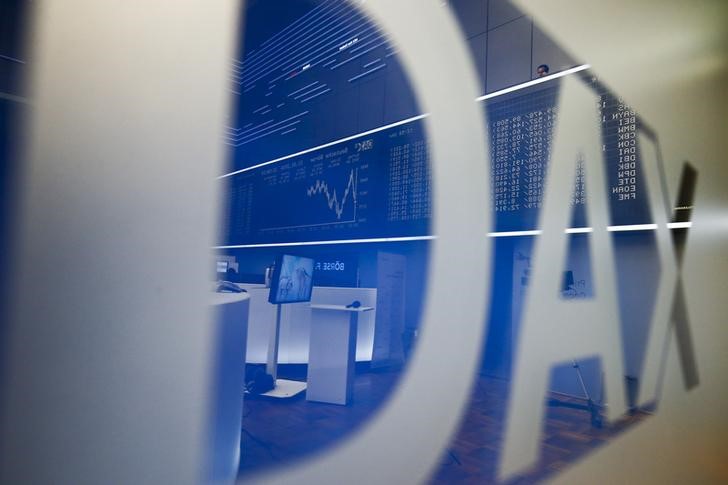
European equity indices edged higher Wednesday ahead of the release of regional manufacturing activity data, but investors remain cautious amid trade uncertainty and in the build up to the latest European Central Bank meeting.
At 03:05 ET (07:05 GMT), the DAX index in Germany climbed 0.7%, the CAC 40 in France gained 0.4% and the FTSE 100 in the U.K. rose 0.1%.
Uncertainty over trade talks
European stocks have followed their Asian counterparts higher Wednesday, boosted by hopes that a trade deal could still be possible when U.S. President Donald Trump and Chinese leader Xi Jinping talk this week.
However, these gains are tentative, with trade tensions still elevated as Trump earlier signed a proclamation raising his tariffs on steel and aluminum to 50% from 25%, making good on his earlier threat, with the higher duties effective from Wednesday.
Additionally, Trump on Wednesday described Xi Jinping as a tough negotiator, amid the ongoing tariff rift between the two countries.
"I like President XI of China, always have, and always will, but he is VERY TOUGH, AND EXTREMELY HARD TO MAKE A DEAL WITH!!!," Trump wrote in a post on his social media platform, Truth Social.
Today is the deadline for U.S. trading partners to submit their "best offer" to avoid punishing import tax rates, and so far, only Britain has struck a preliminary trade agreement with the U.S. during Trump’s 90-day pause on a wider array of tariffs.
The European Union said earlier this week that it had yet to receive a letter from Washington asking for its best proposals on trade talks, a point duplicated by Japanese Chief Cabinet Secretary Yoshimasa Hayashi earlier Wednesday.
PMI data due ahead of ECB meeting
The European economic data slate centers around a series of manufacturing activity data from the region Wednesday, as investors await the latest policy-setting meeting of the European Central Bank, due for completion on Thursday.
There have been some signs of economic recovery in Europe, but from a low base, and eurozone consumer prices slowed to 1.9% last month, which is seen providing the ECB with room to cut interest rates by a quarter point once more, in what would be an eighth rate reduction in the past year.
However, where the ECB goes after this is open to debate as U.S. tariff uncertainty, heightened further by ambiguity over court rulings on the legality of the tariffs, makes the backdrop challenging as the ECB weighs the impact to business activity against implications for inflation further out.
Remy Cointreau sees weak sales in key markets
In the corporate sector, spirits group Remy Cointreau (EPA:RCOP) reported a smaller-than-expected drop in annual organic operating profit, reflecting weak sales in its key markets of China and the United States.
The French company also withdrew its mid-term goals and said sales would return to mid-to-single-digit growth during the next financial year.
Swedbank (ST:SWEDa) said that it is maintaining its return on equity target of at least 15% for the coming years, reaffirming a goal the Swedish banking group had set through 2025.
Airbus (EPA:AIR) will also be in the spotlight after Bloomberg reported China is reportedly contemplating an extensive order from the aircraft manufacturer, which could be finalized as early as next month.
Crude slips back from two-week highs
Oil prices slipped lower Wednesday, falling back from recent highs generated by increasing OPEC+ output and concerns that tariffs will hit global economic activity.
At 03:05 ET, Brent futures slipped 0.3% to $65.41 a barrel, and U.S. West Texas Intermediate crude futures fell 0.4% to $61.18 a barrel.
Both benchmarks climbed about 2% on Tuesday to a two-week high, driven by worries over supply disruption from Canadian wildfires and expectations that Iran would reject a U.S. nuclear deal proposal key to easing sanctions on the major oil producer.
Additionally, the Organization of the Petroleum Exporting Countries and allies, known as OPEC+, agreed to keep output increases in July at 411,000 barrels per day, which was less than some in the market had feared.

HANOI (Reuters) -Vietnam said on Friday its trade minister met with the U.S. Commerce Secretary and senators during a visit to the United States, pledging during talks on tariffs to narrow their trade gap and combat trade fraud and illegal transhipment.
Vietnam and the United States this week concluded a second round of trade negotiations, as the Southeast Asian industrial hub seeks a deal to avoid a 46% tariff rate on Vietnamese goods, imposed largely due to its big trade surplus with Washington.
During the meeting with the U.S. Commerce Secretary Howard Lutnick, Trade Minister Nguyen Hong Dien also urged the United States to recognise Vietnam as a market economy soon and to remove it from its strategic export control lists, the ministry said.
Despite Vietnam consistently being one of Asia’s fastest-growing economies in the past two decades and its multiple free-trade agreements, the United States still recognises it as a non-market economy, despite Hanoi arguing it has made sufficient reforms to justify an upgrade.
The United States is Vietnam’s largest export market and its trade surplus with Washington exceeded $123 billion last year, a trade gap Hanoi says it is committed to narrowing.
"This would bring practical benefits to both countries and help improve bilateral trade in a fairer, more harmonious and more sustainable manner," the ministry said in a statement.
Dien also separately met U.S. senators, including Ted Cruz and Steve Daines, and pledged during the meetings to promote more balanced bilateral trade.
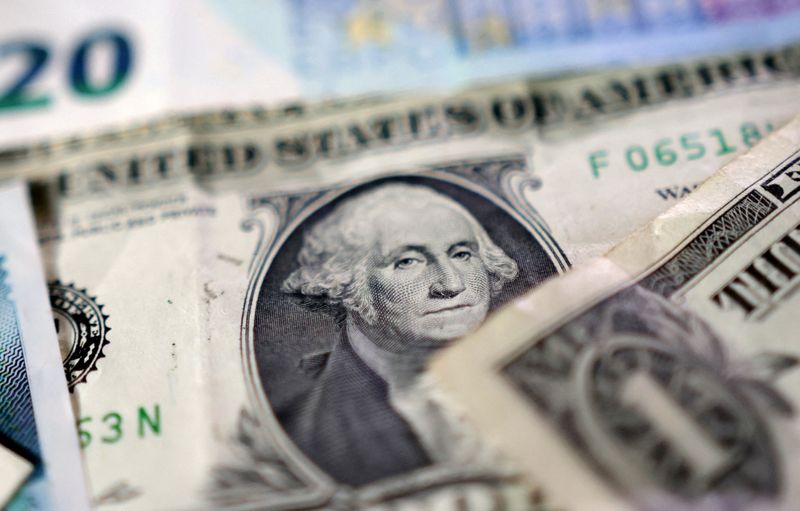
By Ankur Banerjee
SINGAPORE (Reuters) -The U.S. dollar was soft on Friday, poised to make its first weekly drop in five weeks against the euro and the yen as worries over the United States’ worsening fiscal health sent investors scurrying for safe havens.
After Moody’s last week downgraded its U.S. debt ratings, investor attention this week has honed in on the country’s $36 trillion debt pile and U.S. President Donald Trump’s tax bill that could add trillions of dollars more to it.
Dubbed by Trump as a "big, beautiful bill", it narrowly passed Republican-controlled U.S. House of Representatives and now heads to the Senate for what is likely to be weeks of debate.
The dollar index, which compares the U.S. currency against six other units, including the yen and euro, is set for 1.1% decline this week though it was little changed at 99.829 in early Asia trade.
That’s despite a steep selloff in U.S. Treasuries at the start of the week. The 30-year bond yield stayed above 5% in Asian hours on Friday, hovering near 19 month highs. It is close to October 2023’s high of 5.179%, a break past which would take it to its highest since mid-2007.
The elevated yield hasn’t underpinned the dollar as investors flee U.S. assets in a "Sell America" move similar to last month.
"What has become quite stark this week is the reaction function in broad markets to the rise in U.S. long-end Treasury yields," said Chris Weston, head of research at Pepperstone.
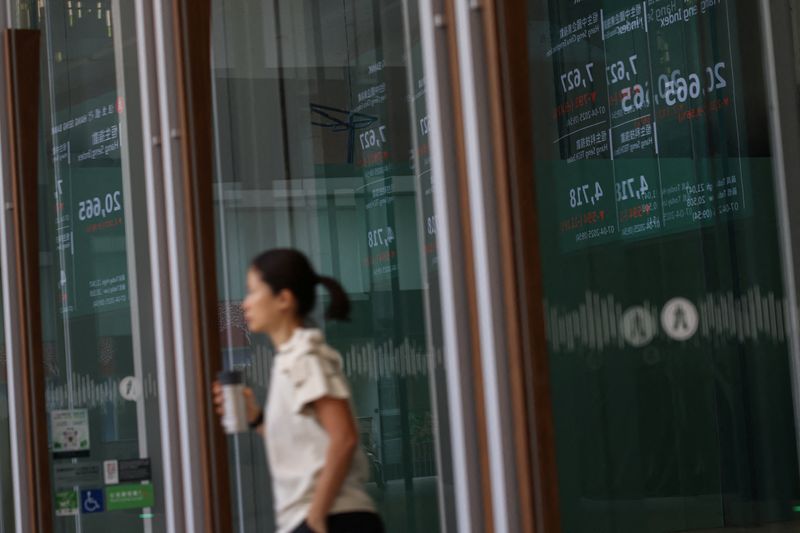
By Stella Qiu
SYDNEY (Reuters) - Asian shares made some tentative gains on Friday as beaten-down Treasuries found buyers after U.S. President Donald Trump’s tax bill narrowly passed the lower house, although debt worries still lingered.
Overnight, PMI data around the globe showed U.S. business activity picked up pace in May, which helped Wall Street rise earlier in the session before running into selling pressures and closing the day largely flat. In contrast, disappointingly weak activity in Europe dragged shares there lower. [.N]
Nasdaq futures and S&P 500 futures both were flat.
The Republican-controlled U.S. House voted by a slim margin to pass Trump’s tax cut bill, which would fulfil many of his campaign pledges, but will increase the $36.2 trillion U.S. debt pile by $3.8 trillion over the next decade.
Treasury yields, especially at the longer-dated end, have climbed on worries about U.S. fiscal health in the run-up to the passage of the bill. That was exacerbated by the decision from Moody’s last week to downgrade the U.S. credit rating, citing rising debt.
The 30-year bonds, however, did manage to find some buyers overnight with prices now at some attractive levels. Their yields fell another 1 basis point to 5.037% on Friday, having dropped 4 bps to pull away from a 19-month top of 5.161% earlier in the session.
"Maybe the certainty of getting something through has been enough to alleviate some of the fear, panic in the market, but as well as that, it is not unusual in big moves for there to be a bit of overshoot," said Ken Crompton, senior interest rate strategist at the National Australia Bank (OTC:NABZY).
"There is certainly nothing in this market move or the passage of this version of the bill that tells me there is going to be meaningful reductions in U.S. bond issuance or this broader concern about global bond supply."
In Asia, yields on super-long Japanese government bonds (JGBs) held near all-time highs on Friday. The 30-year yields have jumped 23 basis points this week and were last at 3.175%, which is being monitored closely by the Bank of Japan.
The MSCI’s broadest index of Asia-Pacific shares outside Japan inched up 0.1% on Friday but for the week it is still set for a loss of 0.4% after five weeks of gains.
Chinese blue chips and Hong Kong’s Hang Seng were largely flat.
Japan’s Nikkei rose 1% as data showed Japan’s core inflation accelerated at its fastest annual pace in more than two years in April.
In the currency market, the dollar was on the back foot again and is headed for a weekly drop of 1.2% against its major peers. The euro is set for the first weekly rise after four weeks of declines, and was up 0.2% on Friday at $1.1302. [FRX/]
U.S. Federal Reserve Governor Christopher Waller said on Thursday he still sees a path to rate cuts later this year, but noted that the outlook depends on where Trump’s tariff policy settles.
Bitcoin is set for a weekly gain of 7% at $111,524, having touched a record high of $111,965 just on Thursday.
Oil prices fell for a fourth straight session on the prospects of further output increases by OPEC+ countries. U.S. crude futures dropped 0.7% to $60.76 a barrel and were down 2.7% for the week.
Brent fell 0.6% at $64.03 per barrel.
In precious metals, gold prices were flat at $3,292 an ounce, but were set for a weekly gain of 2.8%.

By Leika Kihara
TOKYO (Reuters) -Japan’s core inflation accelerated at its fastest annual pace in more than two years in April, data showed on Friday, raising the odds of another interest rate hike by year-end.
The data underscores the Bank of Japan’s predicament of balancing price pressures from persistent food inflation against growth headwinds from U.S. President Donald Trump’s tariffs.
The core consumer price index (CPI), which excludes fresh food but includes oil prices, rose 3.5% in April from a year earlier, exceeding market forecasts for a 3.4% gain and accelerating from a 3.2% increase in March.
It was also the fastest annual pace of growth for the index since the 4.2% rise in January 2023, holding above the central bank’s 2% target for more than three years.
"Underlying inflation remained strong in April despite the slashing of public high school fees," said Marcel Thieliant, head of Asia-Pacific at Capital Economics.
"Our own view is that the persistent strength in inflation will convince the (BOJ) to hike interest rates yet again in October," contrary to the dominant market view that U.S. trade tensions will force it to hold fire this year, Thieliant said.
A Reuters poll of economists showed that the BOJ will hold rates steady through September, with a small majority forecasting a 25-basis point rate hike by year-end.
Another index stripping away both fuel and fresh food, which is scrutinised by the BOJ as a better gauge of demand-driven price pressure, rose 3.0% in April from a year earlier, the data showed. It accelerated from a 2.9% gain in March.
Food inflation accelerated to 7.0% in April from 6.2% in March in a sign many companies hiked prices at the April start of Japan’s new fiscal year. The price of rice spiked 98.6% last month from a year earlier, while that of chocolate jumped 31%.
Service-sector inflation was more moderate at 1.3% in April, compared with 1.4% in March, suggesting companies were slow in passing on rising labour costs, the data showed.
The BOJ ended a decade-long, massive stimulus programme last year and in January raised short-term interest rates to 0.5% on the view Japan was on the cusp of durably meeting its 2% inflation target.
While the central bank has signalled readiness to raise rates further, the economic repercussions from Trump’s tariffs have complicated decisions around the timing of the next rate increase.
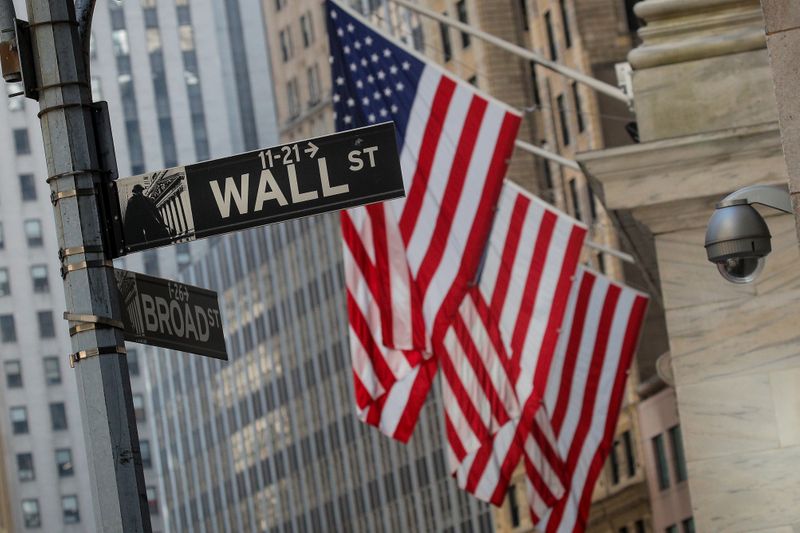
The S&P 500 closed just below the flatline Thursday following the recent rout as dip-buying in tech was kept in check by fragile sentiment amid ongoing concerns over high U.S. debt levels.
At 4:00 p.m. ET (20:00 GMT), the Dow Jones Industrial Average fell 1 point, or 0%, and the S&P 500 index gained 0.03%, while the NASDAQ Composite added 0.3%.
The main averages slumped on Wednesday, with the blue chip Dow Jones Industrial Average falling over 800 points, weighed down by a spike in U.S. Treasury yields.
Tech leads market bounce off lows
Dip-buying in tech stocks, led by Alphabet (NASDAQ:GOOGL), helped the broader market steady, with the latter adding to this weeks gains following its developer conference earlier this week.
The tech giant used the event to defend its Search product, which is under threat from newer generative AI rivals.
Elsewhere in tech, Snowflake (NYSE:SNOW) stock surged after the cloud-based data storage company raised its fiscal 2026 forecast for product revenue, betting on strong demand for its data analytics services as enterprises prioritize artificial intelligence spending.
House passes tax and spending bill
U.S. President Donald Trump’s tax bill narrowly passed the House on Thursday morning, overcoming days of political wrangling between Republicans in control of the lower chamber of Congress.
The measure passed by a narrow 215-214 margin, with all Democrats opposing the bill.
The bill now moves to the Senate, where some lawmakers are pushing for revisions, with a vote on approval expected by August.
The U.S. House Rules Committee on late Wednesday approved President Donald Trump’s expansive tax and spending bill after a nearly 22-hour session, media reports showed.
Along with the extension of 2017 tax cuts, the legislation would slash taxes charged on tips and car loans, while boosting spending on defense and border security. Reductions to key food and health programs for low-income Americans are also included in the bill.
Critics have expressed concerns over potential cuts to social programs and increased national debt. Nonpartisan analysts have estimated that the reductions could add between $3 trillion to $5 trillion to the country’s $36.2 trillion debt pile over the next decade.
Jobless claims point to still-solid labor market
Economic concerns, exacerbated by the trade turmoil over the last couple of months, have also weighed on stock markets.
The number of Americans filing new applications for unemployment benefits dropped last week, suggesting the economy maintained a steady pace of job growth in May.
Initial claims for state unemployment benefits fell 2,000 to a seasonally adjusted 227,000 for the week ended May 17, the Labor Department said on Thursday.
S&P Global’s composite purchasing managers’ index cooled to 50.6 last month, down from 53.5 in March and only slightly above the 50-point level denoting expansion.
The index’s tracker of the manufacturing sector is seen slowing to 49.9 in May, while the services gauge is expected to edge up slightly to 51.0.
Urban Outfitters shines on earnings stage
Urban Outfitters (NASDAQ:URBN) stock soaring following a stronger-than-expected quarterly report - the second straight quarter of strong revenue gains and the third consecutive quarter of accelerating EPS growth.
Analog Devices (NASDAQ:ADI) stock rose after the chipmaker beat expectations for quarterly revenue, driven by upbeat demand for its chips used in the automotive and industrial sectors.
Additionally, Nike (NYSE:NKE) stock rose 2% after the footwear retailer said it is planning to raise prices of some products from next week and will sell items on Amazon (NASDAQ:AMZN) after six years.
(Peter Nurse, Ambar Warrick contributed to this article.)

